Visits From Wasps. How Nature's Pest Control Works
It's been a while since I last wrote anything other than a community post. I've had lots going on, so there are plenty of things I'd love to put down in writing, but no time to actually do so. The weekend is here again and I'm determined to get through some of this growing pile of sewing repairs, so I'm attempting to combine it with writing and curating. It's not very effective, though.
Recently I was lucky to witness a process of nature in the garden that I'd never seen before. I've seen the results of it plenty of times, but never the actual process leading up to it, so I called on my daughter to photograph it for me. It's a bit of a gruesome process, but fascinating nonetheless and beneficial to the garden.
As usual the broccoli plant has become the laying ground for cabbage white butterflies and I noticed the gaping holes in its leaves, so began to look underneath them for the familiar green caterpillars my chooks enjoy. My first find was a small one, but the second leaf I lifted gave me quite the surprise!
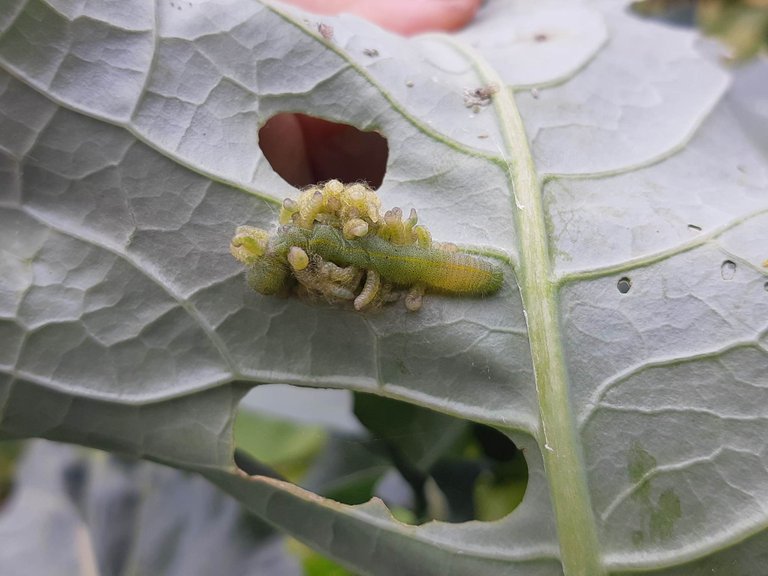
I found another caterpillar, but a parasitic wasp had beaten me to it and I was greeted by this wriggling mass. Over the next hour or two they spun their webbing and quickly moved onto their cocoon phase, culminating in the little, fluffy, yellow cluster that I usually discover.
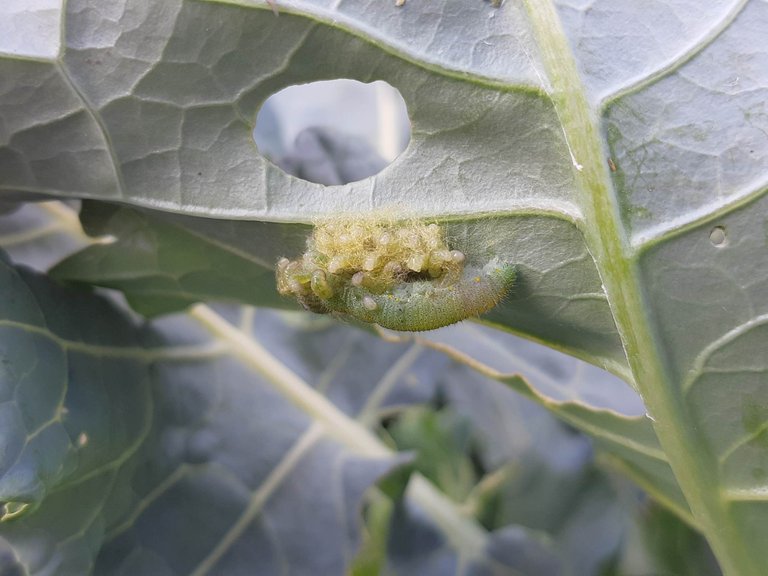
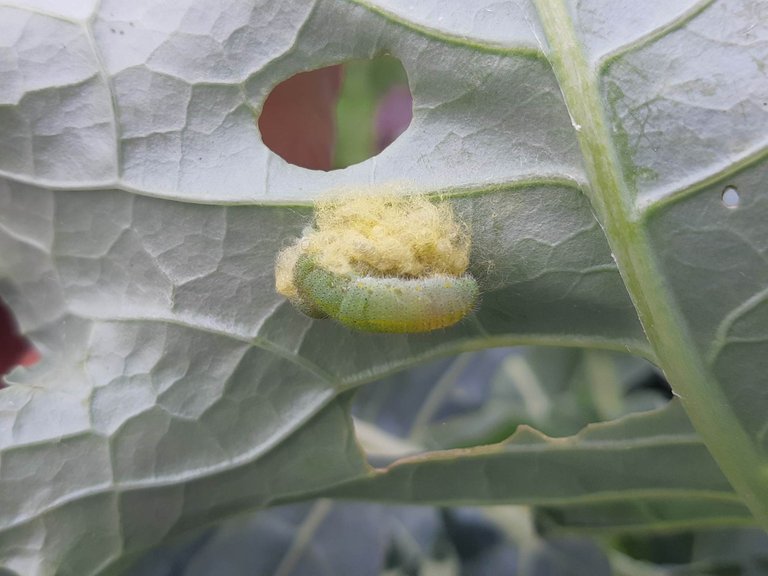
A few days later and no sign of the caterpillar was to be seen. It also looks like the wasps had already emerged. Imagine if I could have seen that process too!
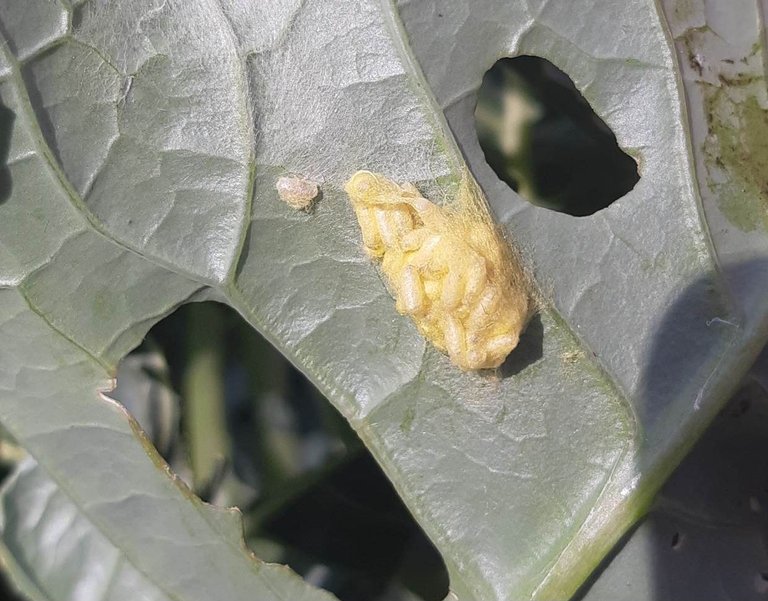
While I'm sure my chickens would just as happily eat these grubs as any other, I like to encourage them to live and breed, because they are nature's way of keeping things in balance. With me having even less time than usual for the garden, letting nature keep things in check is more important than ever. The more of these parasitic wasps around the better the cabbage white population will be kept in check. They really haven't been as problematic as they used to be before I started seeing those yellow cocoon clusters.
You may have noticed that higher up on the leaf in the first photo there is a little group of another type of pest that loves a lot of edible plants in the garden. Even though they are tiny, aphids also have a parasitic wasp that predates them. While they may not eat away the leaves like caterpillars do, in large numbers they can cause real damage to a plant.
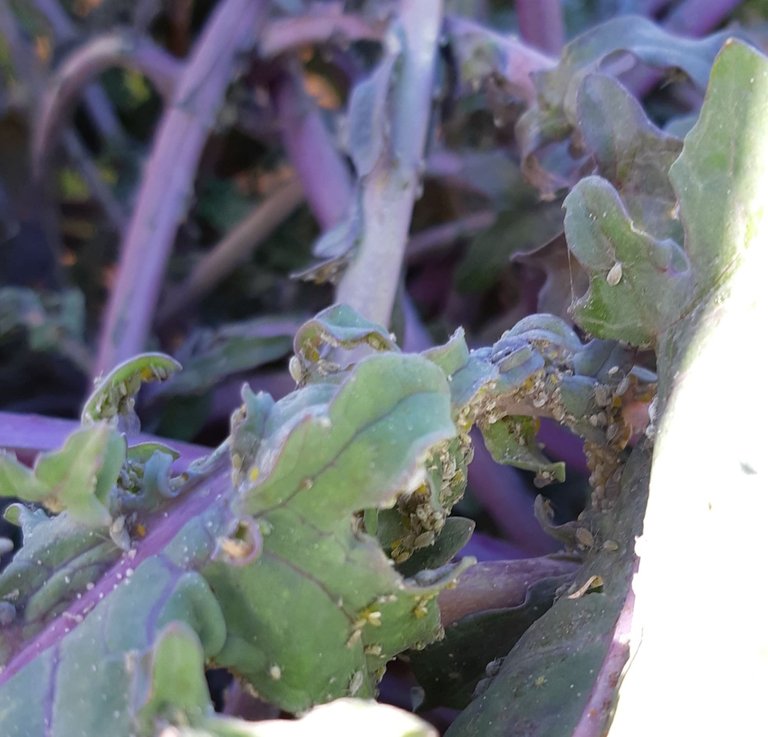
They are known as sap-suckers and they damage the plant by feeding on the liquid nutrients as they are transported through the leaves. When there are only a few of them the plant won't necessarily show any signs of distress, but when I see curling and misshapen leaves it's a sure sign that there is a bad infestation.
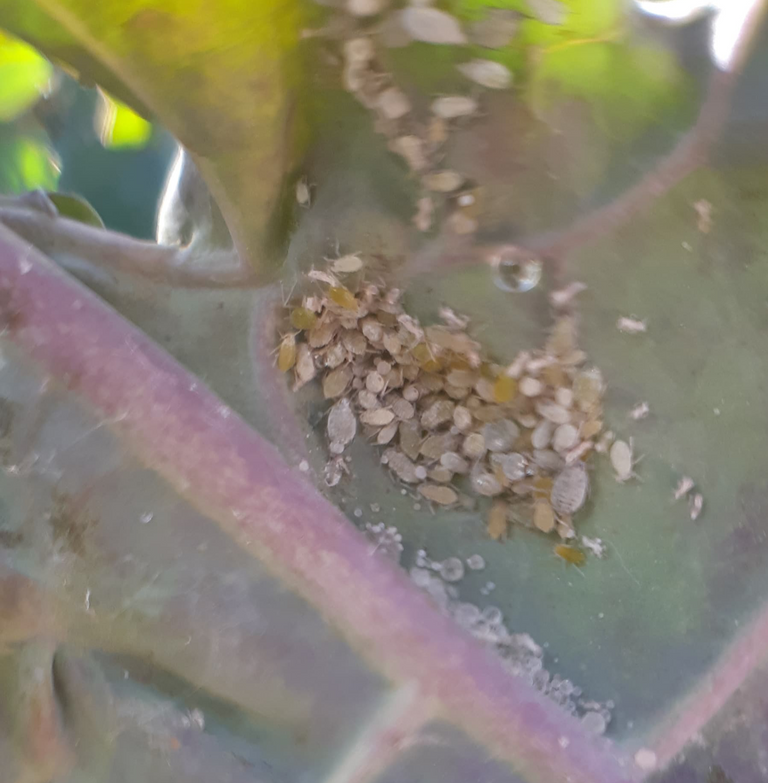
When I get a bad infestation I'll hose the aphids off the plant, then check periodically until I see either ladybirds, ladybird larvae or signs a parasitic wasp had paid them a visit. Happily I haven't even need to hose those in the top photo off, because they have already been paid a visit since this photo was taken.
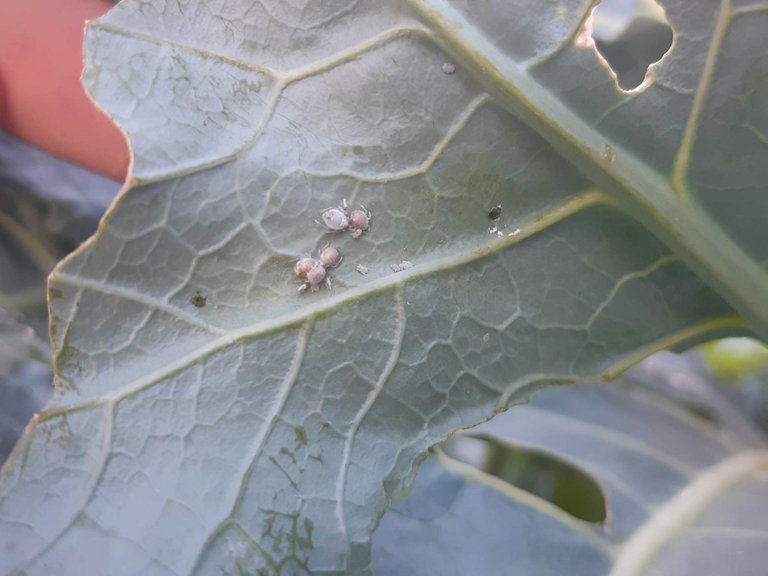
So how can you tell if the wasp has stopped by? See the photo above. Can you see how five of them are like fat little balls and all but one have gone brown? That's the baby wasp growing inside of them. Soon they will be empty round husks with a tiny hole where the wasp emerged.
So there we have it. Nature's brutal, but intriguing pest control. If you spray pesticides you won't get this happening, because pesticides don't discriminate and will kill the predators too. This actually ends up compounding pest issues, because they will develop a resistance to the pesticides, but it's way harder for the predators to bounce back from population decimation.
Hi @minismallholding,
Thank you for participating in the #teamuk curated tag. We have upvoted your quality content.
For more information visit our discord https://discord.gg/8CVx2Am
I guess there is a way we can prevent pests from disturbing our plants. Well, I don't really know about it but you should make research and try it
So don't you think the wasps are any good for controlling pests?
This is the first time I've seen these insects up close.
I think I would be very scared if I accidentally touched it.
good luck my friend.
Haha! I absolutely avoided touching it! Grubs and caterpillars actually give me the creeps.
Here in the "upper left" corner of the US we also have quite the issue with the cabbage whites on broccoli, cauliflower, actual cabbage and so on. Haven't really seen any signs of parasitic wasps, though... so we have to control them through other means.
Our aphids mostly seem to enjoy snacking on the roses. Last year, we actually purchased a box of ladybugs and set them free in the garden, and that was surprisingly effective.
I was actually just wondering how wide spread these types of wasps might be across the world. I don't recall ever seeing the signs of them in the UK. It's also hard to know what pesticides have done to populations in didn't regions.
Here in South Australia, some of the local growers have been introducing predator species for pest control, so that might be why we're seeing them in our own gardens now too. I think other gardeners will be benefiting from your generous ladybird purchase too.
A bit "on the fence" about introducing parasitic species... maybe it's OK with insects, but I've seen it go horribly wrong with mammals and fish, where the imported "solution" turns around and becomes a major problem, throwing the ecosystem out of balance.
Then again, we probably only hear about the extreme cases.
I think with the predator insects it's more of a reintroduction after pesticides have decimated populations. Being in Australia I know all too well the problems introducing imported species which don't belong causes. We even have plagues of millipedes and earwigs from Europe which do better here than the native ones.
Nature has gifted us with a lot things to observe, let's praise the nature and its effective countermeasures.
!LUV
@minismallholding, @lordshah(2/4) sent you LUV. | tools | discord | community | HiveWiki |
HiveWiki |  NFT | <>< daily
NFT | <>< daily
Nature really is amazing. Not always pretty, though. 😅
Thank you for sharing your experience of witnessing nature's pest control in action. It's always exciting to see the intricate and fascinating processes that occur in the natural world, especially in our own gardens. Your dedication to letting nature take its course and keeping things in balance is truly admirable. It's important to remember that nature has its own ways of dealing with pests, and we can learn a lot from observing and respecting its methods. Keep up the great work and thank you for being a steward of the earth.
I was pretty excited to be able to share it. You read and hear a lot about the theory of it, but it is never quite the same as seeing it in action yourself. I was dubious when I started avoiding even "natural" pesticides as to whether a balance really could be reached and it took a few years for it to prove itself.
Well photographed! I've not yet managed to catch the wasp larvae in action. Just the before and after pics. That I haven't caught them 'inflagrante delicto' is what's holding up my website pages on wasps.
Her camera on her phone is way better than any I have. She so wants a new one with an even better camera, though. 😆 I did wonder about videoing it too, as the wriggling was quite interesting.
Have you gotten pictures of the actual wasps themselves? I've yet to see them...or I have and just didn't know.
We all want better equipment 🤣
Yes, I've managed to get pics of the Wasps. Epending on the species they can be smaller than the Aphids
These are pests and diseases that must be handled well and not too late all will have holes
I hope that it will be resolved quickly so that the plant grows back healthy
Congratulations @minismallholding! You have completed the following achievement on the Hive blockchain And have been rewarded with New badge(s)
Your next payout target is 16000 HP.
The unit is Hive Power equivalent because post and comment rewards can be split into HP and HBD
You can view your badges on your board and compare yourself to others in the Ranking
If you no longer want to receive notifications, reply to this comment with the word
STOPCheck out our last posts:
Support the HiveBuzz project. Vote for our proposal!